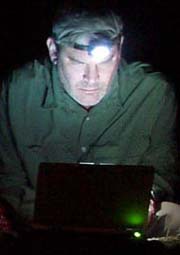Dawn on New Year's Day
January 1, 2005
Moraka Beach, Equatorial Guinea
N 3.25878° E 8.48594 ° Elevation 8 feet. Temp: 75° F
It’s 6 a.m. on New Year’s Day as I write this, which means our friends and family back in the States are blowing their noisemakers and celebrating the New Year at this moment. Here on Bioko, the gray sky with an ambivalent mixture of clouds is beginning to brighten -- a hint of sunrise is in the air. Several tree hyraxes in the forest nearby are our noisemakers, cutting loose with their shrill, ascending call in harmony with the rhythmic crash of the surf and the constant thrum of the crickets.
I hear the camp cook banging some pots over by the kitchen, which has acquired the perpetual smell of fish. I’ll be getting up soon to pack my day bag. A few of us, including Inquirer Photographer Barbara Johnston, will make an overnight hike today to the village of Ureca, the only settlement on Bioko island’s rainy southern coast. We hope to view a sample of life there in a remote village and to talk with villagers about what conservation strategies make sense to them. Ureca is about a five hour hike from here, with several stream crossings.
Since we’ll be packing light, I’m leaving the electronic gear at the beach camp, so this blog will go silent until tomorrow.
Moraka Beach, Equatorial Guinea
N 3.25878° E 8.48594 ° Elevation 8 feet. Temp: 75° F
It’s 6 a.m. on New Year’s Day as I write this, which means our friends and family back in the States are blowing their noisemakers and celebrating the New Year at this moment. Here on Bioko, the gray sky with an ambivalent mixture of clouds is beginning to brighten -- a hint of sunrise is in the air. Several tree hyraxes in the forest nearby are our noisemakers, cutting loose with their shrill, ascending call in harmony with the rhythmic crash of the surf and the constant thrum of the crickets.
I hear the camp cook banging some pots over by the kitchen, which has acquired the perpetual smell of fish. I’ll be getting up soon to pack my day bag. A few of us, including Inquirer Photographer Barbara Johnston, will make an overnight hike today to the village of Ureca, the only settlement on Bioko island’s rainy southern coast. We hope to view a sample of life there in a remote village and to talk with villagers about what conservation strategies make sense to them. Ureca is about a five hour hike from here, with several stream crossings.
Since we’ll be packing light, I’m leaving the electronic gear at the beach camp, so this blog will go silent until tomorrow.



